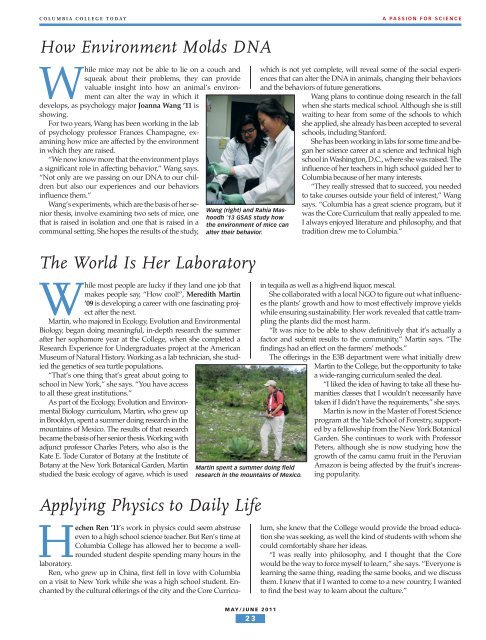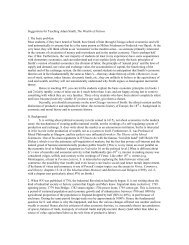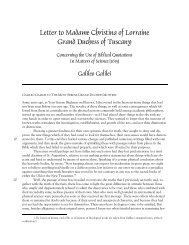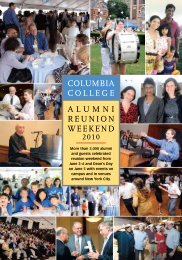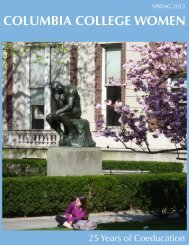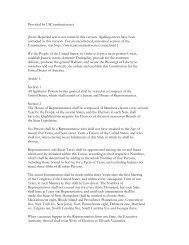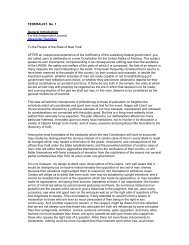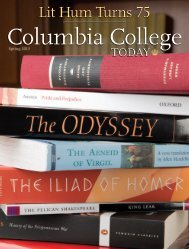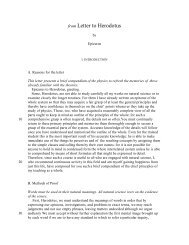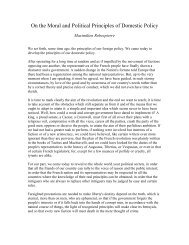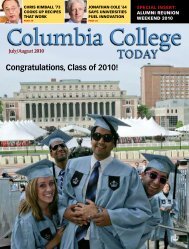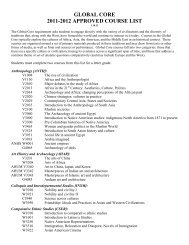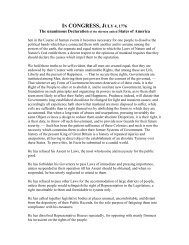A Passion for Science - Columbia College - Columbia University
A Passion for Science - Columbia College - Columbia University
A Passion for Science - Columbia College - Columbia University
You also want an ePaper? Increase the reach of your titles
YUMPU automatically turns print PDFs into web optimized ePapers that Google loves.
<strong>Columbia</strong> CollEgE Today A PASSION FOR SCIENCE<br />
How Environment Molds DNA<br />
While mice may not be able to lie on a couch and<br />
squeak about their problems, they can provide<br />
valuable insight into how an animal’s environment<br />
can alter the way in which it<br />
develops, as psychology major Joanna wang ’11 is<br />
showing.<br />
For two years, Wang has been working in the lab<br />
of psychology professor Frances Champagne, examining<br />
how mice are affected by the environment<br />
in which they are raised.<br />
“We now know more that the environment plays<br />
a significant role in affecting behavior,” Wang says.<br />
“Not only are we passing on our DNA to our children<br />
but also our experiences and our behaviors<br />
influence them.”<br />
Wang’s experiments, which are the basis of her senior<br />
thesis, involve examining two sets of mice, one<br />
that is raised in isolation and one that is raised in a<br />
communal setting. She hopes the results of the study,<br />
The World Is Her Laboratory<br />
while most people are lucky if they land one job that<br />
makes people say, “How cool!”, Meredith Martin<br />
’09 is developing a career with one fascinating project<br />
after the next.<br />
Martin, who majored in Ecology, Evolution and Environmental<br />
Biology, began doing meaningful, in-depth research the summer<br />
after her sophomore year at the <strong>College</strong>, when she completed a<br />
Research Experience <strong>for</strong> Undergraduates project at the American<br />
Museum of Natural History. Working as a lab technician, she studied<br />
the genetics of sea turtle populations.<br />
“That’s one thing that’s great about going to<br />
school in New York,” she says. “You have access<br />
to all these great institutions.”<br />
As part of the Ecology, Evolution and Environmental<br />
Biology curriculum, Martin, who grew up<br />
in Brooklyn, spent a summer doing research in the<br />
mountains of Mexico. The results of that research<br />
became the basis of her senior thesis. Working with<br />
adjunct professor Charles Peters, who also is the<br />
Kate E. Tode Curator of Botany at the Institute of<br />
Botany at the New York Botanical Garden, Martin<br />
studied the basic ecology of agave, which is used<br />
Hechen ren ’11’s work in physics could seem abstruse<br />
even to a high school science teacher. But Ren’s time at<br />
<strong>Columbia</strong> <strong>College</strong> has allowed her to become a wellrounded<br />
student despite spending many hours in the<br />
laboratory.<br />
Ren, who grew up in China, first fell in love with <strong>Columbia</strong><br />
on a visit to New York while she was a high school student. Enchanted<br />
by the cultural offerings of the city and the Core Curricu-<br />
Wang (right) and Rahia Mashoodh<br />
’13 GSAS study how<br />
the environment of mice can<br />
alter their behavior.<br />
Martin spent a summer doing field<br />
research in the mountains of Mexico.<br />
Applying Physics to Daily Life<br />
MAY/JUNE 2011<br />
23<br />
which is not yet complete, will reveal some of the social experiences<br />
that can alter the DNA in animals, changing their behaviors<br />
and the behaviors of future generations.<br />
Wang plans to continue doing research in the fall<br />
when she starts medical school. Although she is still<br />
waiting to hear from some of the schools to which<br />
she applied, she already has been accepted to several<br />
schools, including Stan<strong>for</strong>d.<br />
She has been working in labs <strong>for</strong> some time and began<br />
her science career at a science and technical high<br />
school in Washington, D.C., where she was raised. The<br />
influence of her teachers in high school guided her to<br />
<strong>Columbia</strong> because of her many interests.<br />
“They really stressed that to succeed, you needed<br />
to take courses outside your field of interest,” Wang<br />
says. “<strong>Columbia</strong> has a great science program, but it<br />
was the Core Curriculum that really appealed to me.<br />
I always enjoyed literature and philosophy, and that<br />
tradition drew me to <strong>Columbia</strong>.”<br />
in tequila as well as a high-end liquor, mescal.<br />
She collaborated with a local NGO to figure out what influences<br />
the plants’ growth and how to most effectively improve yields<br />
while ensuring sustainability. Her work revealed that cattle trampling<br />
the plants did the most harm.<br />
“It was nice to be able to show definitively that it’s actually a<br />
factor and submit results to the community,” Martin says. “The<br />
findings had an effect on the farmers’ methods.”<br />
The offerings in the E3B department were what initially drew<br />
Martin to the <strong>College</strong>, but the opportunity to take<br />
a wide-ranging curriculum sealed the deal.<br />
“I liked the idea of having to take all these humanities<br />
classes that I wouldn’t necessarily have<br />
taken if I didn’t have the requirements,” she says.<br />
Martin is now in the Master of Forest <strong>Science</strong><br />
program at the Yale School of Forestry, supported<br />
by a fellowship from the New York Botanical<br />
Garden. She continues to work with Professor<br />
Peters, although she is now studying how the<br />
growth of the camu camu fruit in the Peruvian<br />
Amazon is being affected by the fruit’s increasing<br />
popularity.<br />
lum, she knew that the <strong>College</strong> would provide the broad education<br />
she was seeking, as well the kind of students with whom she<br />
could com<strong>for</strong>tably share her ideas.<br />
“I was really into philosophy, and I thought that the Core<br />
would be the way to <strong>for</strong>ce myself to learn,” she says. “Everyone is<br />
learning the same thing, reading the same books, and we discuss<br />
them. I knew that if I wanted to come to a new country, I wanted<br />
to find the best way to learn about the culture.”


